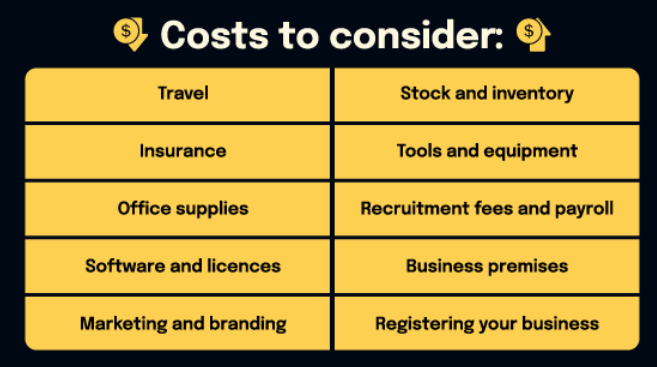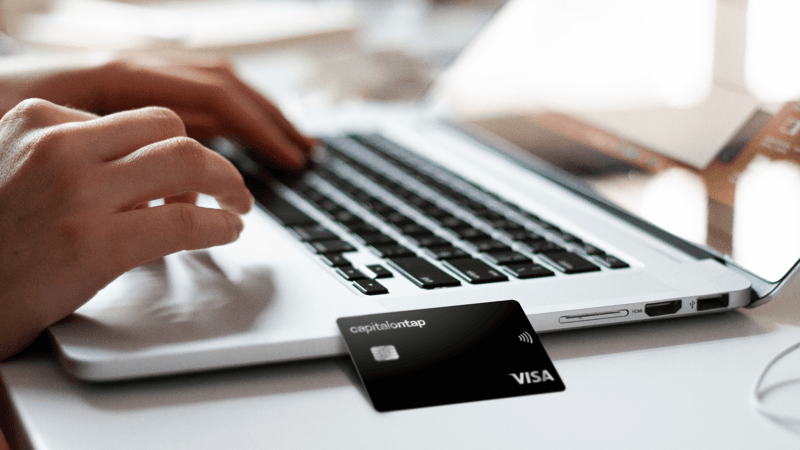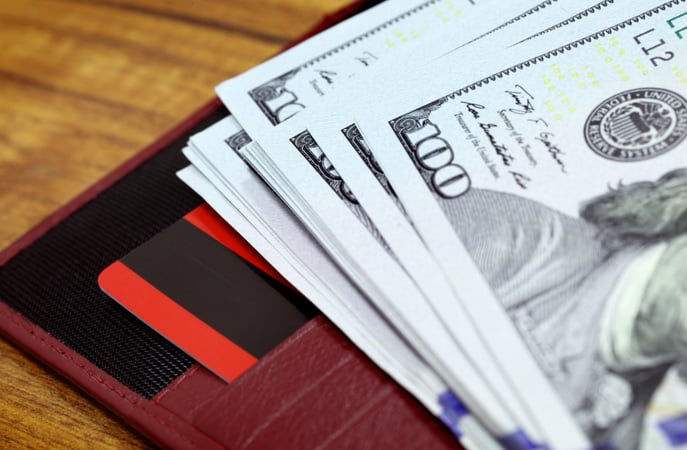Jump to a section
Got that entrepreneurial mindset, but not sure how much it costs to start a business? From developing your product to marketing and branding, there are numerous expenses associated with getting a business up and running.
Typically, the average business start up cost ranges from $30,000 to $40,000. Nevertheless, the initial investment for starting a business can vary significantly. For example, if you're starting an online business without inventory, you may only need a few hundred dollars for creating a website and initial marketing. On the other hand, if you're opening a physical store, expenses can quickly add up to hundreds of thousands of dollars for things like renting a location, buying furniture or office supplies, and getting necessary equipment.
Although there’s no one-size-fits-all answer, familiarizing yourself with typical startup expenses can provide valuable insights for making an accurate calculation for your business. So whether you're a first-time entrepreneur, or a seasoned business owner, we’ll provide you with the information you need to make informed decisions about starting your business.
How to put together your estimated cost to start a business
The classic stereotype suggests that small businesses often fail because they run out of cash. So when drafting your business plan, it’s a much better idea to overestimate your startup costs. This allows you to account for potential inflation and unforeseen expenses that may arise.
But, before you begin to consider the cost of starting your business, it's crucial to have a clear understanding of how your business will operate. Seeking expert advice about how to operate can be beneficial in determining the best legal and financial models that align with your business objectives.
Once you understand how your business will operate, you can start assessing your startup costs. Common startup costs business owners need to know include:
Incorporation fees
To operate legally, you'll need to incorporate your business. This will involve choosing a business name, registering your business structure, and obtaining any necessary licenses and permits. You can hire a corporate lawyer to do this for you, or file the paperwork yourself.
In the US, registering your company can cost anything from $600 to $1,400 depending on the state where you intend to operate.
Business premises
The cost of office space or commercial premises will vary greatly depending on the state, city and town it’s located in, the size of the property, and the facilities available, such as a parking lot or a concierge service.
In addition to mortgage or rental payments, you’ll also be responsible for paying any utility bills such as electricity, gas, water, and internet.
Recruitment fees and payroll
Advertising open roles on job boards such as Indeed, or using a recruitment agency to find the right candidate will both incur fees. Once you’ve onboarded your employees, you’ll have to budget for their wages, your employer payroll taxes, and supplementary benefit costs (if applicable).
Tools and equipment
If you’re looking to start a business in industries such as construction, automotive, or manufacturing, you’re going to need tools and equipment to operate.
When considering the costs of tools and equipment, think about factors such as the type of work you will be doing, the size of your business, and your budget. To ensure you get the best price, research suppliers that offer the tools and equipment you need and compare factors such as price, quality, delivery times, and customer service when choosing a supplier.
If purchasing equipment outright is not feasible, consider financing options such as equipment leasing or financing as these options can help you spread out the cost of equipment over time.
Stock and inventory
If your business plan is to sell goods, you’ll need to purchase stock and inventory so you’re ready to go when you open!
You also need to consider expenses related to stock and inventory, such as testing products, managing defective items, and dealing with surplus stock, as these have the potential to result in significant costs.
Marketing and branding
Marketing and branding are two essential components of building a successful business, but they can also be costly. Determine how much you can afford to spend, and prioritize your efforts based on what will have the most significant impact on your business. Digital marketing is an effective and often more cost-efficient way to reach your target audience. Consider investing in social media advertising, email marketing, and search engine optimization (SEO) to increase your visibility online.
It's important to track the return on investment (ROI) of your marketing and branding efforts. This will help you determine what's working and what's not, and make adjustments as needed.
Software and licenses
In many states or counties, businesses are required to obtain a license to operate. The cost of a business license can vary, typically ranging from $50 to a few hundred dollars for small businesses. If you have an attorney assisting you, they can handle the license filing for you, and you can include the license fee as part of your overall legal expenses.
Most small businesses also require software to operate efficiently. Examples include accounting and finance software for managing financial transactions, creating financial statements, and keeping track of taxes, or inventory management software to help businesses track inventory levels, manage orders, and optimize supply chain operations.
Office supplies
Whether for a home office or for a whole office floor, purchasing office supplies is an important expense when starting your own business. It's important to prioritize essential items such as computers, printers, and other necessary technology. These items may require a larger investment upfront but are critical to the success of your business.
Insurance
Business insurance offers a safety net against a variety of unforeseen circumstances that could arise when your business is operating. The cost of insurance will depend on the level of coverage you need and the type of business you are operating, and the industry you’re operating in. Generally, the cost of business insurance can range from a few hundred to several thousand dollars per year.
Travel
Not everyone starting a business will need to factor travel costs into their startup costs, but if your business will require you to visit clients or make deliveries to customers, you will be traveling a lot.
Being flexible with your travel plans can save you a significant amount of money. Consider traveling during off-peak times or booking tickets well in advance to take advantage of lower prices.
If you’re going to be traveling by car, ensure you budget enough funds for gas and fill up at cheaper gas stations where possible.

What is the average cost to start a business?
The cost of opening a small business may vary depending on the type of business you choose to start. Business.org research suggests that:
-
Online business owners spend $35,000 in the first year
-
Mobile business owners spend an average of $92,500 in the first year
-
Storefront business owners spend an average of $100,000 in the first year
This spending can be broken down in the following way:
30% on inventory
21% on equipment
15% on location
12% on taxes
7% on utilities
6% on payroll
Can I start a business with no money?
Having no money doesn’t mean your business dream is over. Having money would make starting a business easier, but it’s not impossible!
The easiest way to start a business with no money is to sell your skills and time, rather than physical goods. Low-cost business ideas include:
-
Dog walking
-
House sitting
-
Cleaning
-
Tutoring
How much does it cost to start a business online?
Starting an online business is likely to cost far less upfront than launching a traditional brick and mortar business, such as a garage or coffee shop, as there’s no need to rent or buy a working space.
Online businesses tend to also have lower overhead costs; a website is available 24/7 to process sales, whereas a physical business requires premises, staff, and utilities to open. You’d still need to pay for electricity and your employees' wages, even if no sales are made throughout the day.
Despite this, setting up an online business shouldn’t be considered a ‘low-cost’ alternative as there are still expenses to consider, including:
-
Website development: If you don't have the technical skills to build a website yourself, you may need to hire a professional web designer to create a custom site. The cost of web development can vary depending on the complexity of your website and the hourly rate of the designer.
-
Domain registration and hosting: Once your website is developed, you will need to register a domain name and find a web hosting service. The cost of domain registration varies depending on the domain name and hosting package you choose. On average, domain registration and hosting can cost between $20 and $100 per year.
-
Payment processing fees: To accept online payments, you will need to choose a payment processor. Popular payment processors like PayPal, Stripe, and Worldpay charge a percentage of the transaction value as a processing fee. These fees can vary from 1.5% to 3% per transaction.
-
Business insurance: Just like any business, an online business needs insurance coverage to protect against risks such as cyber threats, product liability, and business interruption.
What are the different types of business costs?
When totaling up how much it will cost to start your business, you should also give some thought to the types of costs you will be paying as they can have a significant impact on the profitability and sustainability of your business.
One-time costs
The clue’s in the name. One-time costs are costs you only pay once, such as incorporation fees or purchasing a website domain.
Fixed or ongoing costs
Fixed costs don’t change, even if your level of output varies. For example, the cost of renting the factory where a business produces its goods will not change whether the business is producing 100 units or 1000 units per hour.
Variable costs
Variable costs relate directly to the production or sale of a product or service; if production increases, variable costs will also increase. For example, if a business producing children’s bikes pays its employees by the hour, hourly wage costs would increase at times where increased production is needed, such as before Christmas.
Essential costs
Essential costs must be made to keep your business alive. Without paying them, your business wouldn’t survive. Essential costs may include incorporation fees, purchasing stock, or hiring staff.
Optional costs
These are non-essential costs, such as a launch party or office decorations. You should not spend money on these costs unless you have the cash to do so without eating into your reserves.
Understanding these different types of costs is critical for any business owner who wants to succeed in today's competitive marketplace. Here are some reasons why:
-
Budgeting and forecasting: Understanding the different types of costs can help you create a realistic budget and forecast for your business as some costs are predictable, while others aren’t. By accurately forecasting your costs, you can make informed decisions about pricing, sales targets, and profit margins.
-
Pricing strategy: Knowing your costs is essential for setting prices that will allow your business to be profitable. If you don't understand the different types of costs, you may underprice your products or services and not generate enough revenue to cover your expenses.
-
Cost control: Understanding the different types of costs can help you identify areas where you can reduce expenses and improve your bottom line. For example, if you have high fixed costs, you may need to focus on reducing variable costs to increase profitability. Or if you have high variable costs, such as labor and materials, you may need to look for ways to streamline your production process or negotiate better prices with suppliers.
Bottom line
As well as money, starting your own business will cost your time; it requires hard work, dedication, and a willingness to take risks. However, with careful planning and execution, it can be a fulfilling and profitable venture. By carefully considering these costs, and staying focused on your goals, you can successfully start and grow your own business.
When you’re ready for a line of credit to boost your small business growth, apply for a Capital on Tap Business Credit Card, issued by WebBank. Enjoy credit limits up to $50,000, uncapped 1.5% cashback, and free cards for all your employees.
*This does not constitute financial advice. If you want to understand your startup costs in detail, you should speak to your financial advisor or accountant.










